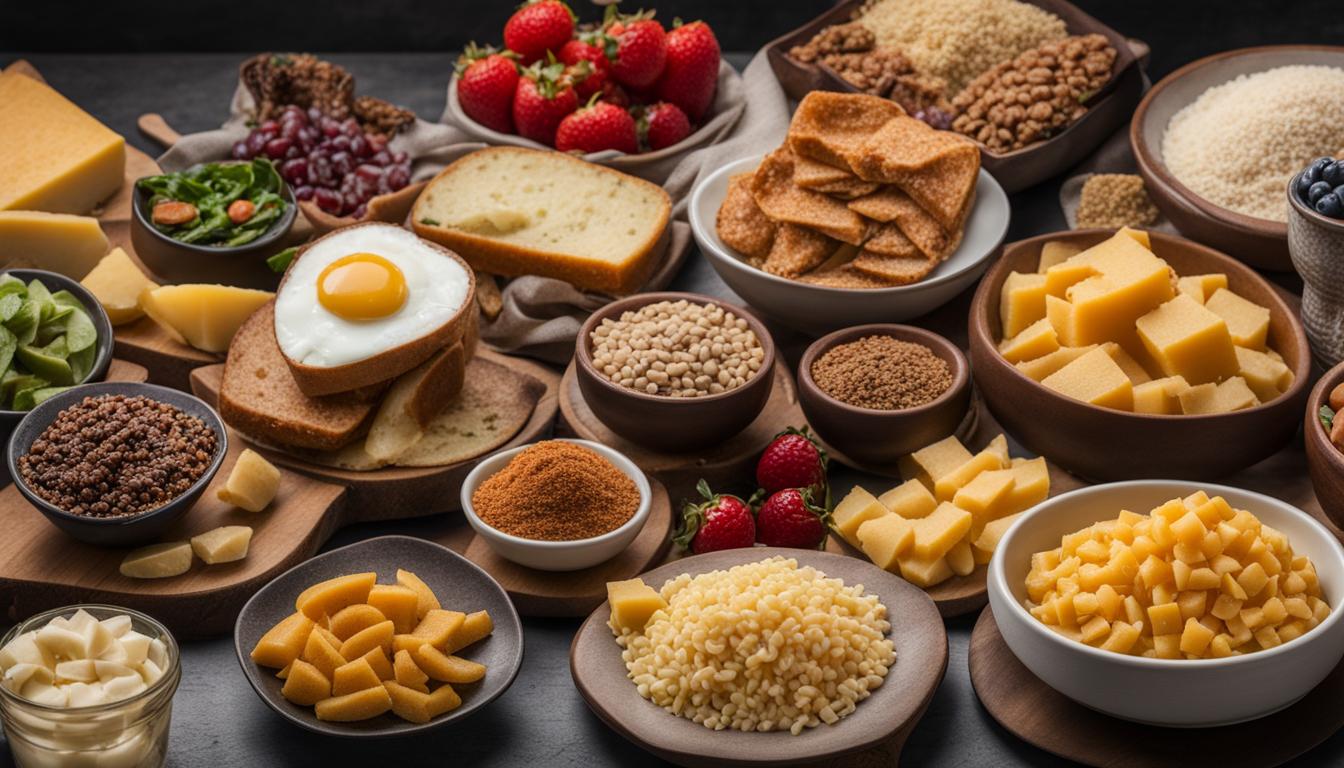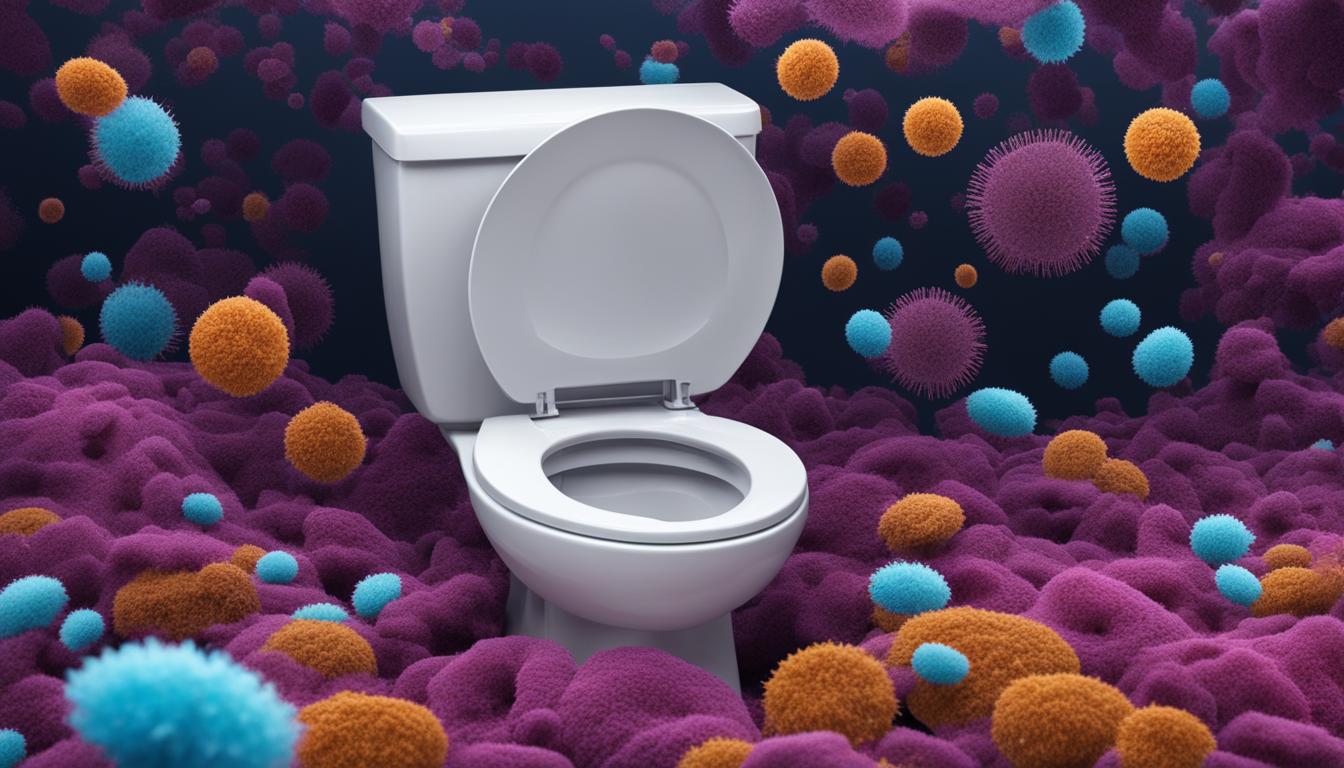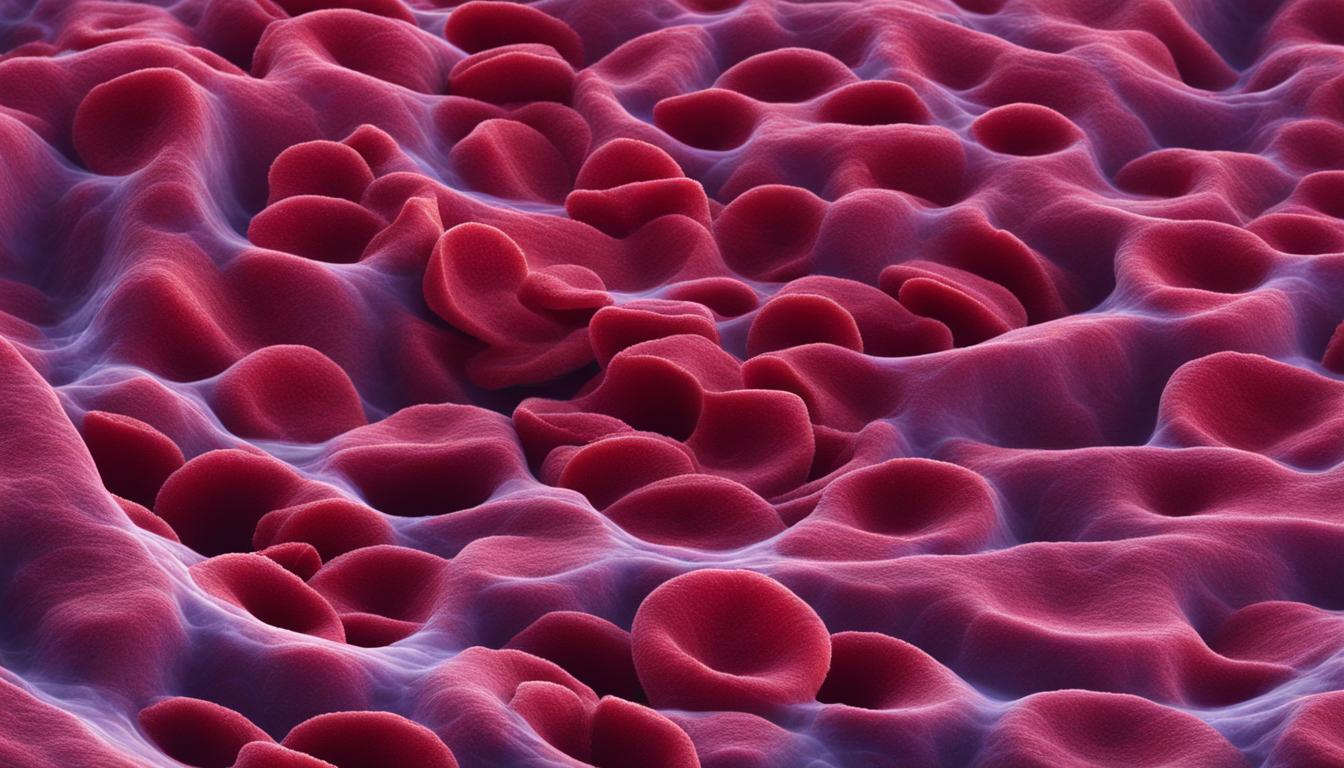Are you tired of hearing conflicting information about your health? It’s time to separate fact from fiction and debunk those common health myths that have been circulating. In this article, we aim to provide accurate information and dispel misconceptions about various health topics. Let’s dive in and bust those myths!
Key Takeaways:
- Don’t believe everything you hear – there are many misconceptions about health out there.
- Eggs are not bad for you, as long as they are consumed in moderation and prepared in a healthy way.
- Canned and frozen fruits and vegetables can be just as nutritious as fresh ones, as long as they are free from unhealthy additives.
- The amount of water you need varies depending on individual factors, so consult a doctor for personalized recommendations.
- Carbohydrates are an important part of a balanced diet, but it’s important to choose the right types.
The Truth About Eggs: Debunking Myths
Contrary to popular belief, eggs are not bad for you. While they do contain cholesterol and fat, they are also a great source of protein and contain essential vitamins and minerals. The yolks, often feared for their cholesterol content, actually have healthier fats that can help lower “bad cholesterol” levels. Additionally, egg yolks are a natural source of vitamin D, which is important for bone and teeth health. It’s important to note that the overall nutritional benefits of eggs can depend on how they are prepared and consumed.

When it comes to myths about eggs, it’s important to separate fact from fiction. Here are some common misconceptions:
- Myth: Eggs raise cholesterol levels – Fact: The cholesterol in eggs has little impact on blood cholesterol levels for most people. According to studies, dietary cholesterol has a minimal effect on the cholesterol levels in your body.
- Myth: Only egg whites are healthy – Fact: While egg whites are a good source of protein, the yolks contain most of the essential nutrients. Including the yolk in your diet can provide valuable vitamins and minerals.
- Myth: Brown eggs are healthier than white eggs – Fact: The color of the eggshell has no impact on its nutritional composition. The color is determined by the breed of the hen and doesn’t affect the quality or nutritional value of the egg.
By debunking these myths and understanding the true nutritional value of eggs, you can confidently enjoy this versatile and nutritious food as part of a healthy diet.
Fresh vs. Canned/Frozen: Busting the Myth
When it comes to fruits and vegetables, there has long been a debate about whether fresh is always better than canned or frozen options. The prevailing belief is that fresh produce is healthier and more nutritious. However, this is not entirely true. While fresh fruits and vegetables are generally preferred, it’s important to understand that canned and frozen options can also provide essential nutrients.
The nutritional value of canned and frozen fruits and vegetables is often underestimated. In fact, when packaged without unhealthy additives, these options can retain the same amount of nutrients as their fresh counterparts. Canning and freezing processes are designed to preserve the nutritional content of the produce. This means that even canned or frozen fruits and vegetables can be a valuable source of vitamins, minerals, and antioxidants.
However, it’s essential to make wise choices when opting for canned or frozen options. Avoid canned fruits and vegetables with added salt or syrup, as these can increase sodium and sugar intake. Instead, choose low-sodium alternatives or rinse canned vegetables to reduce salt content. Opt for fruits that are packed in their own juices rather than syrup for a healthier choice. By making these small adjustments, you can enjoy the convenience of canned and frozen produce without sacrificing nutritional value.
Benefits of Canned and Frozen Produce:
- Retain essential nutrients through the canning and freezing process
- Convenient and readily available
- Long shelf life
- Less food waste compared to fresh produce
In conclusion, while fresh fruits and vegetables are generally considered the gold standard, it’s important to recognize the nutritional value that canned and frozen options can offer. By making informed choices and being mindful of additives, you can incorporate a variety of produce into your diet and ensure you are getting the essential nutrients your body needs.

How Much Water Do You Really Need?
There is a common myth that everyone must drink 64 ounces (8 glasses) of water per day, but the truth is, the amount of water needed varies depending on individual factors and health conditions. While staying hydrated is essential, it’s important to understand that the standard recommendation may not apply to everyone.
For healthy individuals, a general guideline is to consume four to six cups of water a day. This includes water from various sources such as beverages, fruits, and vegetables. However, it’s crucial to note that factors like exercise, pregnancy, breastfeeding, and certain medical conditions may require increased water intake. It’s always best to consult with a healthcare professional for personalized recommendations.
One common misconception is that waiting until you feel thirsty to drink water is sufficient. However, by the time you feel thirsty, your body is already dehydrated. It’s important to drink water throughout the day to maintain proper hydration levels. Pay attention to your body’s cues and ensure you are drinking enough water to keep yourself adequately hydrated.

Myths About Water Consumption:
- Everyone must drink 64 ounces (8 glasses) of water per day.
- Feeling thirsty is the only indication that you need to drink water.
- Water intake should be the same for everyone, regardless of individual factors.
“The actual amount of water needed varies depending on individual factors and health conditions.”
Carbohydrates: Debunking the Bad Reputation
Carbohydrates have long been vilified as the enemy of a healthy diet, but the truth is that they are not inherently bad for you. The key lies in choosing the right types of carbohydrates to fuel your body. Processed and highly refined carbohydrates, such as white bread and sugary snacks, should be limited in your diet. Instead, opt for whole grain breads, legumes, fruits, and vegetables, which provide healthier sources of carbohydrates rich in fiber and essential nutrients.
Whole grain breads, for example, are a good source of complex carbs that release energy more slowly, helping to avoid blood sugar spikes. Legumes like lentils and chickpeas are not only high in fiber but also contain important vitamins and minerals. Fruits and vegetables provide a wide range of carbohydrates along with other beneficial nutrients.

It’s worth noting that individuals with diabetes may need to monitor their carbohydrate intake more closely. However, it’s important to work closely with a healthcare provider to develop a personalized plan that meets their nutritional needs. By debunking the myth that all carbohydrates are bad, we can make informed choices about the types of carbohydrates we include in our diet and enjoy a well-rounded, nutritious eating plan.
Separating Myth from Reality: Common Illness Beliefs
There are several common beliefs about illness that have been passed down through generations. However, it’s important to separate myth from reality when it comes to understanding how certain factors contribute to our health. In this section, we will debunk two prevalent beliefs: the correlation between cold weather and sickness, and the myths surrounding vaccines.

Cold Weather and Sickness:
Contrary to popular belief, being outside in cold weather without proper clothing or wet hair does not directly cause illness. Colds and flu are caused by viruses, not weather conditions. However, it is true that lower temperatures and lower humidity in winter create an environment where viruses can survive and spread more easily. Additionally, people tend to come into closer contact indoors during the colder months, increasing the chances of transmission. Therefore, it’s important to practice good hygiene, such as frequent handwashing, to minimize the risk of getting sick during the winter season.
Vaccine Myths:
There are many misconceptions and myths surrounding vaccines. It’s important to rely on scientific evidence and expert opinions when making decisions about vaccination. Contrary to popular belief, vaccines do not make you sick. In fact, vaccines have been proven to prevent and reduce the severity of various illnesses, saving countless lives. Vaccines are thoroughly tested for safety and effectiveness before being administered to the public. It’s crucial to understand that the benefits of vaccines far outweigh any potential risks, and they play a vital role in protecting both individuals and communities from infectious diseases.
In conclusion, understanding the truth behind common illness beliefs is crucial for making informed decisions about our health. Cold weather alone does not cause illness, but it can create conditions that make viruses more prevalent. Vaccines are safe and effective tools for disease prevention, and it’s important to consult with healthcare professionals and rely on scientific evidence when considering vaccination. By separating myth from reality, we can ensure that accurate information guides our health choices.
Health Claims Debunked: Separating Fact from Fiction
There are numerous health claims and beliefs that are often taken as fact, but many of them are actually myths. It’s crucial to separate fact from fiction in order to make informed decisions about our health. In this section, we will explore and debunk several common health claims, relying on expert opinions and scientific evidence to reveal the truth behind these beliefs.
The Truth About Toilet Seats and Infections

Contrary to popular belief, sitting on a public toilet seat does not significantly increase the risk of picking up infections or diseases. The intact skin on the bottom provides some protection from germs, and proper handwashing is far more effective in preventing the transfer of germs. It’s important to maintain good hygiene practices and follow proper handwashing techniques to minimize the risk of infections.
Microwave Ovens and Food Nutrition
There is a common misconception that microwaves emit harmful radiation and can negatively impact the nutrient content of food. However, microwaves are safe to use and do not cause harmful types of radiation like nuclear energy. The electromagnetic radiation emitted by microwaves is not associated with an increased risk of cancer. Additionally, food cooked in the microwave retains its nutrient content, as with any form of cooking. Proper microwaving techniques, such as minimal water usage, can help retain nutrients in the food.
Myths About Personal Habits
- Sleeping with wet hair: Contrary to popular belief, sleeping with wet hair does not directly cause a cold. Contact with a virus is necessary to contract a cold, not external factors like wet hair.
- The “5-second rule” for dropped food: This belief is a myth as bacteria can transfer immediately upon contact. It’s important to discard food that has come into contact with unsanitary surfaces.
- Applying ice to burns: Contrary to popular belief, applying ice directly to burns can actually damage the skin and delay proper healing. It’s best to follow recommended first aid practices for burn treatment.
- Peeling fruits and vegetables: Many essential nutrients are found in the skins of fruits and vegetables. Peeling them may result in a loss of these nutrients. It’s advisable to thoroughly wash produce before consuming.
- X-rays causing cancer: X-rays, when used for medical purposes, emit low levels of radiation and pose a minimal risk. The benefits of X-rays for diagnosing and treating various conditions outweigh the potential risks.
- Cracking joints leading to arthritis: Cracking joints do not cause arthritis. The sound is often due to the release of gas bubbles in the joints and is generally harmless.
- Chocolate causing acne: There is no direct link between chocolate consumption and acne. Acne is primarily caused by hormonal changes and other factors, not chocolate consumption.
- Garlic repelling mosquitoes: Despite popular belief, eating garlic does not repel mosquitoes. Mosquito repellents containing approved ingredients are more effective in preventing mosquito bites.
By debunking these common health myths, we can make more informed choices about our personal habits and overall well-being. It’s important to rely on expert opinions and scientific evidence for accurate information and to dispel popular misconceptions.
The Role of Skin in Disease Prevention
Skin plays a crucial role in protecting our bodies from infections and diseases. Contrary to common misconceptions, the risk of picking up an infection from sitting on a public toilet seat is very low. Intact skin on the bottom provides some protection from germs, and proper handwashing is more effective in preventing the transfer of germs. It’s important to maintain good hygiene practices and follow proper handwashing techniques to minimize the risk of infections.

Additionally, it’s important to debunk the myth that skin exposure to cold weather or going outside with wet hair causes illness. Colds and flu are caused by viruses, not external factors like weather conditions or wet hair. However, lower temperatures and lower humidity in winter can make it easier for viruses to survive and for people to come into closer contact indoors, increasing the chance of transmission. It’s essential to rely on scientific evidence and medical advice when it comes to preventing and managing illnesses.
Another misconception is that applying ice to burns is the best remedy. In reality, applying ice directly to a burn can actually damage the skin further. It’s important to follow proper first aid guidelines, such as running cool water over the burn for several minutes to help alleviate pain and reduce the risk of infection. Greasy home remedies and ointments should be avoided as they can impede the healing process.
Key Takeaways:
- Skin provides some protection against germs on public toilet seats, but proper handwashing is more effective in preventing the transfer of germs.
- Weather conditions and wet hair do not directly cause illness; viruses are the main culprits.
- Applying ice directly to burns can further damage the skin, and it’s important to follow proper first aid guidelines.
By understanding the role of skin in disease prevention and debunking these misconceptions, we can ensure accurate information and make informed choices about our health and well-being.
The Truth About Microwaves and Food Nutrition
There are many misconceptions surrounding the use of microwaves and their impact on food nutrition. Let’s uncover the truth and debunk some common myths.

Myth 1: Microwaves emit harmful radiation and can cause cancer.
Truth: Microwaves use electromagnetic radiation, which is not associated with an increased risk of cancer. They are safe to use and undergo strict testing to ensure they meet safety standards.
Myth 2: Microwaving food destroys its nutrient content.
Truth: Like any cooking method, microwaving can cause some nutrient loss. However, the amount of loss depends on factors such as temperature, cooking time, and the type of food. In fact, microwaving food for shorter periods and at lower temperatures can help minimize nutrient loss compared to other cooking methods.
Myth 3: Microwaving plastic containers releases harmful toxins into food.
Truth: As long as microwave-safe containers are used, there is no risk of harmful toxins leaching into food. It’s important to look for containers labeled as microwave-safe and avoid using plastic containers that are cracked or damaged.
By understanding the truth about microwaves and food nutrition, you can confidently enjoy the convenience and efficiency that microwaving offers without compromising on the nutritional value of your meals.
Common Myths About Personal Habits

There are many personal habits that people believe can cause health problems. However, it’s important to separate fact from fiction and debunk these common myths. Let’s take a closer look at some of these misconceptions:
Myth: Sleeping with wet hair causes a cold.
This is a popular belief, but it’s not true. The common cold is caused by viruses, not external factors like wet hair. While being exposed to cold temperatures can make it easier for viruses to survive and spread, simply sleeping with wet hair does not directly cause a cold.
Myth: The “5-second rule” for dropped food is safe.
Many people believe that if they pick up food within five seconds of dropping it, it’s still safe to eat. However, this is a myth. Bacteria can transfer to the food immediately upon contact, regardless of the duration. It’s best to discard food that has been dropped on the floor to avoid the risk of foodborne illnesses.
Myth: Applying ice to burns is the best remedy.
Contrary to popular belief, applying ice directly to burns can actually damage the skin. It’s recommended to rinse the burn with cool water and cover it with a clean cloth or bandage. Greasy home remedies should be avoided as they can trap heat and worsen the burn.
Myth: Peeling fruits and vegetables removes essential nutrients.
While the skin of fruits and vegetables can contain nutrients, it’s not always necessary to eat them. Some people believe that peeling fruits and vegetables removes essential nutrients, but the truth is, the majority of nutrients are found in the flesh. It’s important to wash produce thoroughly to remove any dirt or pesticides before consuming.
Conclusion
In conclusion, debunking health myths and separating fact from fiction is crucial for making informed decisions about our well-being. By exploring and debunking common health misconceptions, we can ensure that we have accurate information and avoid unnecessary worry. It is important to consult with medical professionals and rely on scientific evidence to make informed choices about our health.
Education and accurate information play a significant role in promoting a healthier lifestyle. By understanding the truths behind popular health myths, we can dispel misconceptions and make choices that are beneficial for our overall well-being. Remember, separating fact from fiction is key in debunking health myths and ensuring we have the right knowledge for a healthier lifestyle.
In summary, debunking health myths provides us with the opportunity to separate fact from fiction. By relying on accurate information and consulting medical professionals, we can make informed choices about our health. Let’s prioritize education, scientific evidence, and accurate information to debunk health myths and foster a healthier lifestyle.
FAQ
Are eggs bad for you?
No, eggs are not bad for you. While they contain cholesterol and fat, they are also a great source of protein and essential vitamins and minerals. The yolks, often feared for their cholesterol content, actually have healthier fats that can lower “bad cholesterol” levels.
Are canned and frozen fruits and vegetables less nutritious than fresh ones?
No, canned and frozen fruits and vegetables can provide the same nutritional value as fresh ones as long as they are packaged without unhealthy additives. Choosing low-sodium options and rinsing canned vegetables can help reduce salt content.
How much water should I drink per day?
The amount of water needed varies depending on individual factors and health conditions. In general, four to six cups of water a day is sufficient for healthy individuals, considering water intake from other sources. However, it’s essential to consult a doctor for personalized recommendations.
Are carbohydrates bad for you?
No, carbohydrates are not inherently bad for you. Your body needs carbohydrates for energy. It’s important to choose the right types, such as whole grain breads, legumes, fruits, and vegetables, which are rich in fiber and essential nutrients.
Can being outside in cold weather without proper clothing or wet hair make you sick?
No, colds and flu are caused by viruses, not weather conditions. However, lower temperatures and lower humidity in winter can make it easier for viruses to survive and for people to come into closer contact indoors, increasing the chance of transmission.
Do vaccines make you sick?
No, vaccines do not make you sick. They are proven to prevent and reduce the severity of various illnesses. It’s important to rely on scientific evidence and medical advice when it comes to preventing and managing illnesses.
Can sitting on a public toilet seat cause infections and diseases?
The risk of picking up an infection from sitting on a toilet seat is very low. Intact skin on the bottom provides some protection from germs, and proper handwashing is more effective in preventing the transfer of germs.
Do microwaves cause harmful radiation?
No, microwaves emit electromagnetic radiation, which is not associated with an increased risk of cancer. Food cooked in the microwave retains its nutrient content, and microwave cooking times often result in lesser nutrient loss compared to other cooking methods.
Does sleeping with wet hair cause a cold?
No, sleeping with wet hair does not directly cause a cold. Contact with a virus is necessary to contract a cold, not external factors like wet hair.
Is the “5-second rule” for dropped food true?
No, the “5-second rule” is a myth as bacteria can transfer immediately upon contact. It’s best to discard dropped food to avoid potential contamination.
Can cracking joints cause arthritis?
No, cracking joints does not cause arthritis. The sound is caused by gas bubbles in the joint fluid and is generally harmless.
Does eating chocolate cause acne?
No, eating chocolate is not directly linked to acne. Acne is caused by hormonal factors and other skin conditions, not chocolate consumption.
Does garlic repel mosquitoes?
No, garlic does not repel mosquitoes. While garlic has some insect-repelling properties, it is not effective against mosquitoes.
Is it important to debunk health myths?
Yes, debunking health myths is crucial for promoting accurate information and preventing unnecessary worry. Consulting with medical professionals and relying on scientific evidence is essential for making informed choices about our health.


